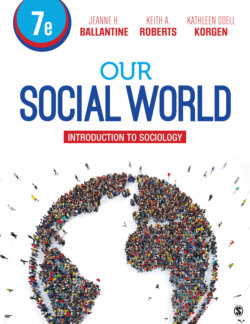Читать книгу Our Social World - Kathleen Odell Korgen - Страница 135
На сайте Литреса книга снята с продажи.
Global Society and Culture.
ОглавлениеSeveral centuries ago there was no “global culture,” but with expanding travel and trade, economic interdependence of different countries, international political linkages, global environmental concerns, and most recently technology allowing for communication throughout the world, people now interact across continents in seconds. Globalization refers to the process by which the entire world is becoming a single sociocultural entity—more uniform, more integrated, and more interdependent. The globalization process brings increased connectedness, uniformity, and interdependency across the planet (Eitzen and Zinn 2012; Martell 2016). It also brings conflicts at the national and regional levels as cultures clash.
Western political and economic structures dominate in the development of this global society, largely as a result of the domination of Western (European and U.S.) worldviews and Western control over resources. For example, the very idea of governing a geographic region with a bureaucratic structure known as a nation-state is a fairly new notion. Formerly, many small bands and tribal groupings dominated areas of the globe. However, with globalization, nation-states now exist in every region of the world.
Global culture includes behavioral standards, symbols, values, and material objects that have become common across the globe (International Beliefs and Values Institute 2012). We need to understand global culture to engage in human rights issues, global education, conflict resolution, sustainability, and religious and cultural understanding. For example, beliefs that monogamy is normal; that marriage should be based on romantic love; that people have a right to life, liberty, and the pursuit of happiness; that people should be free to choose their leaders; that women should have rights such as voting; that wildlife and fragile environments should be protected; and that everyone should have a cell phone and television set are spreading across the globe (Newman 2017).
During the 20th century, the idea of the primacy of individual rights, civil liberties, and human rights spread around the world, creating conflicts within nations that traditionally lacked democratic institutions and processes. Backlashes against these and other Western ideas also can be seen in the acts of groups that have embraced terrorism (Eitzen and Zinn 2012; Timsit 2017). This has resulted in Western societies fighting terrorism when terrorist groups see themselves as trying to preserve their culture (Morey and Yaqin 2011; Peek 2011).
▲ Many simple norms or beliefs about how to behave in public—like waiting in line for a train—have become accepted in cultures throughout the world.
© Reuters/Stringer
Still, these trends are aspects of the emerging global culture. Even 100 years ago, notions of global cooperation and competition would have seemed bizarre (Lechner and Boli 2012). However, in nations around the world, people who travel by plane know they must stand in line, negotiate airport security, squeeze their bodies into confined spaces, and stay seated in the airplane until they are told they can get up (Lechner and Boli 2012). Regardless of nationality, we know how to behave in any airport in the world.
As the world community becomes more interdependent and addresses issues that can only be dealt with at the global level (such as global warming, massive human rights violations as in the Syrian or Yemen revolution or Sudanese war, international terrorism, global food shortages, and global financial crises), the idea of a common “software” of beliefs, social rules, and common interests takes on importance. Common ideas for making decisions allow for shared solutions to conflicts. Global culture at the macro level affects our individual lives, and its influence will only increase.
However, global culture is not the only pattern that is new. Today, we see a counterculture at the global level. Stateless terrorist networks such as al-Shabaab, al-Qaeda, ISIS, Boko Haram, and the Taliban reject the values of international organizations and agreements such as the World Court, the Geneva Convention, and other international systems designed to resolve disputes. Terrorists do not recognize the sovereignty of nations and do not acknowledge some global values of respect for life or for civil discourse. This counterculture at the global level is a more serious threat than those at the micro and meso levels, in part because it does not fit into the global system of nations and its norms. (See the discussion of terrorism in Chapter 13.)
Thinking Sociologically
Make a list of social groups of which you are a part. Place these groups into categories of microculture, subculture, national culture, and global culture. Consider which of them affects only a portion of your day or week (such as your place of work) or only a limited time in your entire life span. Consider which groups are smaller than the nation but will likely influence you over much of your life. To what cross-national (global) groups do you belong? Do you belong to fewer groups at the national culture and global culture levels than at the micro level? If so, why do you suppose that is the case?
